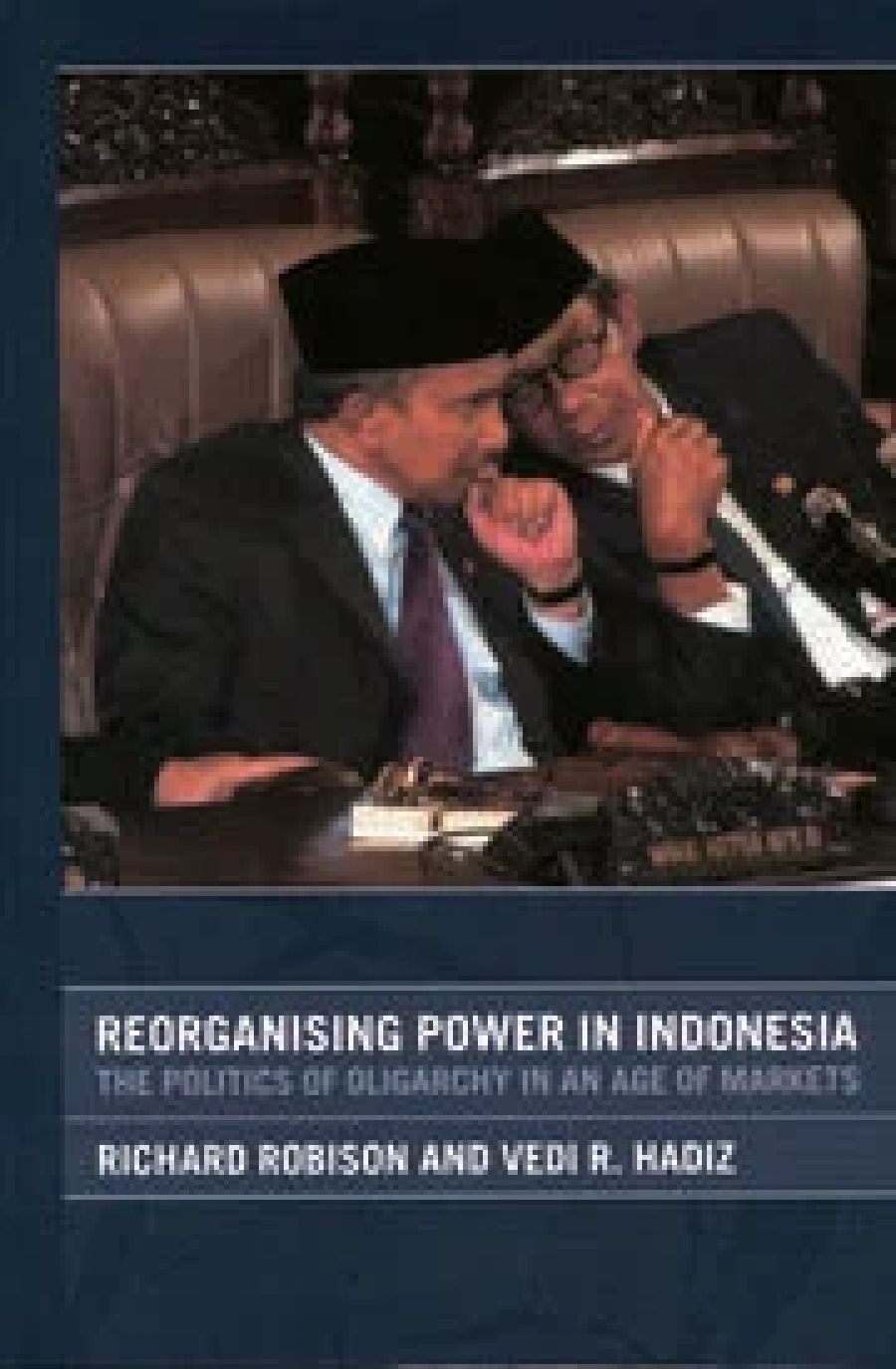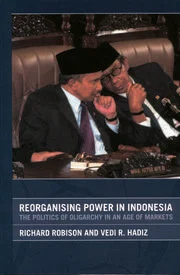
- Free Article: No
- Contents Category: International Studies
- Review Article: Yes
- Article Title: Democracy of sorts
- Online Only: No
- Custom Highlight Text:
Many who have followed Indonesian politics have become increasingly dismayed at the failure of the reform movement that followed the political demise of President Suharto in 1998. The glass is not so much half full or empty; rather, it is cracked and leaking. Indonesia now has a democracy, of sorts, after a constitutional coup against the first elected president, Aburrahman Wahid, and the non-presidency of Megawati Sukarnoputri. In many other respects, Indonesia has regressed. The military is again a power in the state, human rights abuses have increased and there are now more political prisoners than in 1998, if mostly from Aceh and Papua. Similarly, the poor remain very poor, the rich and powerful are again such, and corruption is worse than ever.
- Book 1 Title: Reorganising Power in Indonesia
- Book 1 Subtitle: The politics of oligarchy in an age of markets
- Book 1 Biblio: Routledge-Curzon, $66 pb, 316 pp
- Book 1 Cover Small (400 x 600):

- Book 1 Cover (800 x 1200):

Long-time Indonesia scholar Richard Robison and Singapore-based Vedi Hadiz critically consider these issues in their book Reorganising Power in Indonesia: The Politics of Oligarchy in an Age of Markets. Their approach, however, which is identified by the title, raises a subsidiary methodological issue of structure versus agency. In simple terms, ‘structuralists’ – in this case of the political-economy kind – tend to see political events reflecting economic circumstances. At worst, they are accused of a determinism that tends towards absolutism, and are often susceptible to grand uniting theories. Those in favour of agency tend to see events as being determined by the will of individuals, cultural variables and, to some extent, institutional desire. Structure, for them, is malleable and often ambiguous, despite sometimes obvious connections.
Robison and Hadiz fall very much into the structuralist category, employing an explicit political-economy model to explain Indonesia’s compromised political fortunes. In this, they identify with a fairly conventional Marxist approach. A Marxian analysis remains a useful and perhaps necessary critical tool, but the question is whether it is also sufficient. Robison and Hadiz think so, and, while there is not a lot to disagree with in their account of Indonesian politics, there are bits missing. That is, not only is the question of agency effectively dismissed, but issues that are not a product of market forces also receive scant attention.
For Robison, much of this is familiar territory and was addressed in his previous works. Hadiz, a bright, younger scholar, is more flexible. One can almost detect where Hadiz has contributed to this co-authored book, in that the style shifts to being more inclusive.
The other symptom of this political-economy approach is in a tendency to delineate perspective in a somewhat sectarian fashion. Based on its own ‘correctness’, this assumes the ‘incorrectness’ of others, no matter how close the ‘other’ might be in functional terms, or indeed no matter what the ‘other’ might actually say. For example, Robison and Hadiz claim that Arief Budiman and I say that Indonesia is (or was) in the middle of a transition between ‘predatory rule and the ultimate triumph of liberal forms of market democracy’. Yet the text they cite states that political change has been ‘in virtually all cases, problematic’. This is somewhat closer to the opposite of their allocated transitional triumphalism. Gerry van Klinken, Harold Crouch, Hal Hill, Ross McLeod and others might also raise similar concerns.
Enemies real and invented aside, the most gripping part of this book is its iteration of the fall of Suharto in May 1998. It is a detailed and convincing account, and contains a richness found in few others.
This then sets up the disappointingly slim account of post-Suharto events. There is no doubt, as the authors assert, that the current politico-economic environment is rooted in the past, but there is little specific explanation of that current environment. Suharto fell from power six years before this book was published; it is a pity that period does not receive the same fulsome treatment as does Suharto’s fall.
Related to this, and the specific orientation of the book, Indonesia’s other myriad political issues that cannot be easily explained by markets or the related oligarchy get short shrift. There is nothing on aliran (streams of influence), for instance, or political Islam, much less terrorism or the role of militias, while separatist issues receive just a few sentences. A structuralist interpretation could make sense of these critical issues as a consequence of Indonesia’s somewhat forced post-colonial organisation. But they don’t fit as neatly as a focus on market-oriented oligarchy immediately allows, and are thus neglected.
So, one wrestles with this book, gaining some wonderful insights and admiring the detail, but with a nagging sense that too much is left out or left unexplained, that volition does not count – even though there are many clear examples of where it does – and that ambiguity has no place in understanding. Such certainty about something as complex and convoluted as Indonesian politics is brave indeed.
Robison once dismissed my concern over non-structural factors also producing political outcomes, and I am sure he will do the same now. As with some other Marxists, he also disagreed that we shared common ground, even though our analysis and targets are often the same. It may also be that Robison and Hadiz’s approach is a necessary antidote to the more culturalist turn in political analysis. This book does counter work such as that by Lucien Pye and Bill Liddle nicely.
But this particular approach on its own, even assuming sympathy for a Marxist analysis, is, for most readers, unlikely to prove satisfying. It is a great base upon which to build, dare I say, a more nuanced superstructure. But that, as is usually the case with Indonesia, will require wider reading.


Comments powered by CComment